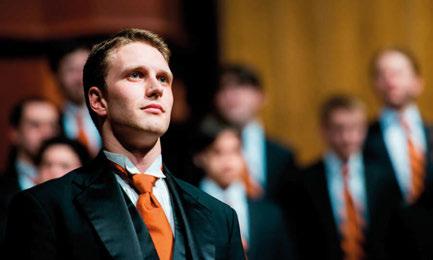




pacificu.edu/music
2015 SCHOLARSHIP AUDITIONS
Saturday, Feb. 14
Monday, Feb. 16
Sunday, Feb. 22
Saturday, Feb. 28
Sunday, March 1
To schedule an audition please call 503-352-2216
DEGREES
Bachelor of Arts in Music
Bachelor of Arts in Music Therapy
Bachelor of Arts in Music Education
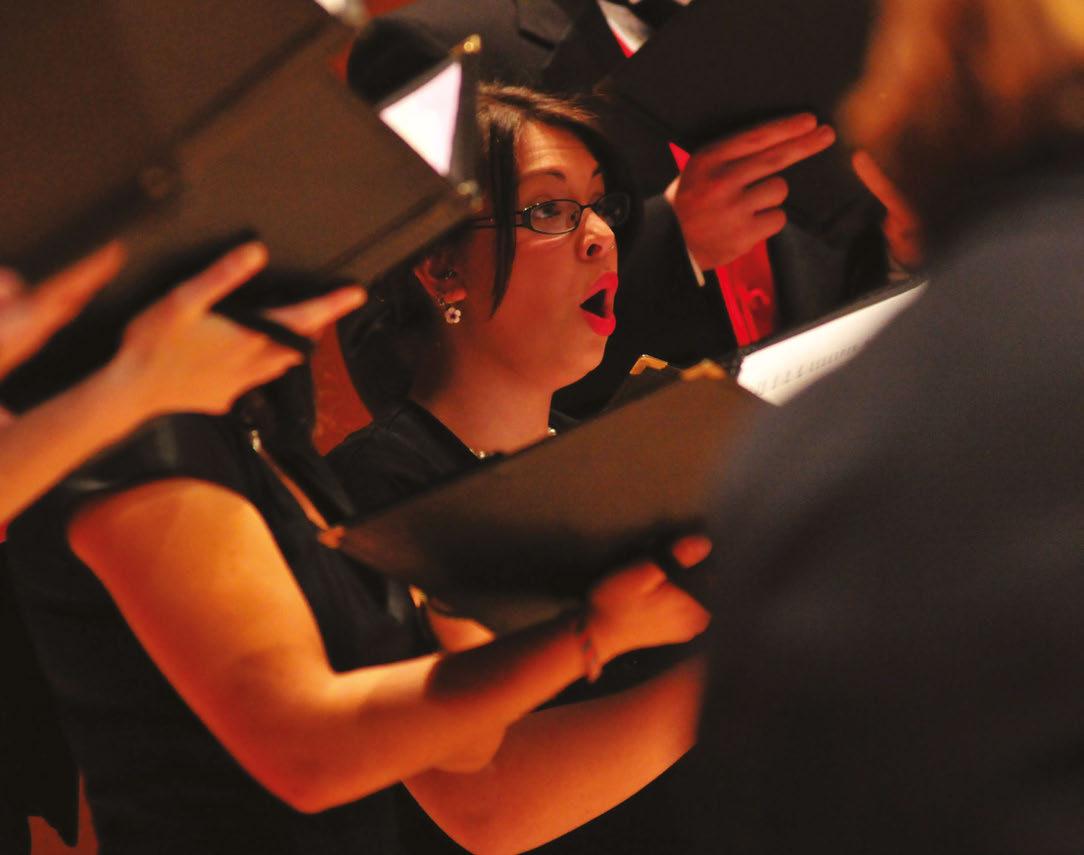
Bachelor of Arts in Music
Performance Emphasis
Minor in Music
ENSEMBLES
Symphonic Band
Orchestra
Jazz Band Chamber Singers
Concert Choir
Boxer Rebellion Pep Band
Small Chamber Ensembles
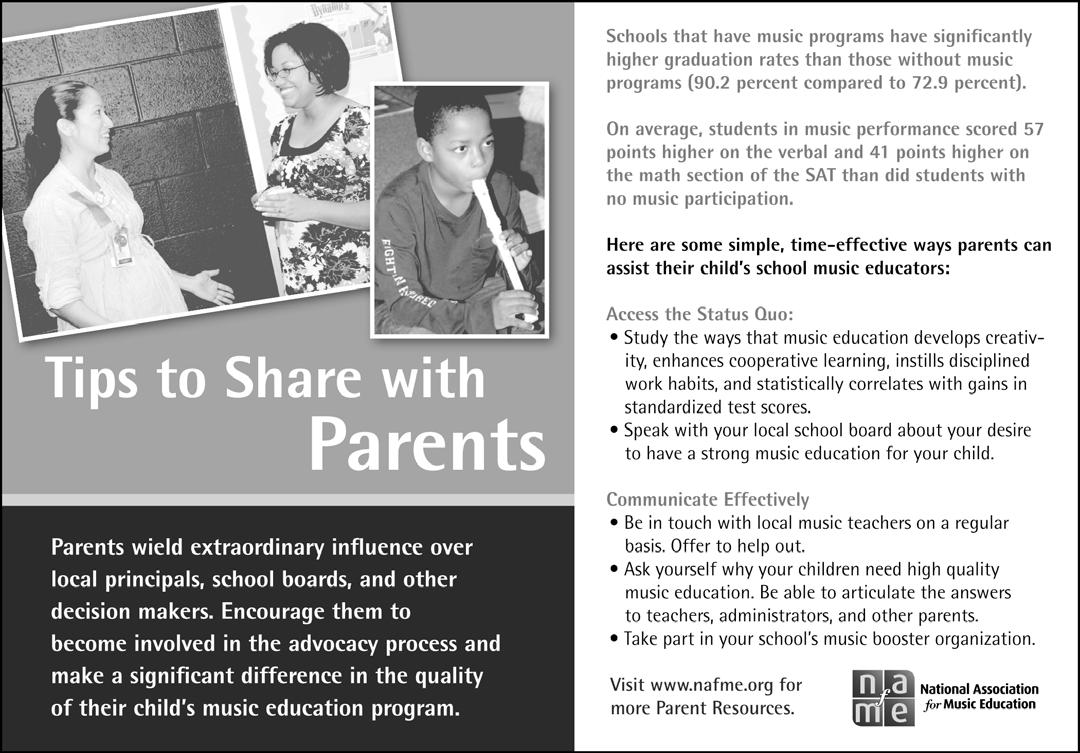
OMEA Board of Control
OMEA President
Tom Muller
David Douglas High School
tom_muller@ddouglas k12 or us
c503-799-6684, s503-261-8386, h503-665-8132
OMEA President-Elect
Frank Diaz University of Oregon fdiaz@uoregon edu
s541-346-3777
OMEA 2nd Vice President
Branden Hansen Roseburg High School
bhansen@roseburg k12 or us
c541-954-4589, s541-440-4167
OMEA Past President
Tina Bull Oregon State University
tina bull@oregonstate edu
c541-231-7361, w541-737-5603
OMEA Treasurer
David Becker
Retired/Lewis and Clark dbecker@lclark edu
c503-407-4707
OMEA Executive Directors
Jim & Jane Howell Board Advisors/No Vote janejim@oregonmusic org
w541-962-6262, c541-805-8683, Toll Free 877-452-6632
District Chairs
District 01 Chair
Jane Schrepping Hosford Middle School jschrepping@pps net s503-916-5640
District 02 Chair
Rob McGlothin
Sandy High School
robert mcglothin@ortrail k12 or us
c503-421-2697, s503-668-8011 x7226
District 03 Chair
Michael McClure
Warrenton Grade/High School
mcclurem@whsd k12 or us
s503-861-3376
District 04 Chair
Kelsie Demianew Cummings Elementary kelsie demianew@gmail com
s503-399-3141
District 05 Chair
Dan Judd
Summit High School
dan judd@bend k12 or us
s541-355-4185
District 06 Chair
Chris Leavitt
La Grande High School
chris leavitt@lagrandesd org
c541-786-8242
District 07 Chair
Ken Graber
North Bend High School
kgraber@nbend k12 or us
s541-751-7145
District 08 Chair
Jon Soderberg-Chase
Ashland High School
jon soderberg-chase@ashland k12 or us
541-482-8771
District 09 Chair
Matthew Fletcher
Nyssa MS & HS mfletcher@nyssa k12 or us
District 10 Chair
Robert Carwithen
David Douglas High School
CarwithenR@wdsd org
District 11 Chair
Aubrey Peterson
Corvallis High School
Aubrey Peterson@corvallis k12 or us
c541-659-4681, s541-757-5907
District 12 Chair
Tim Vian tim vian@springfield k12 or us
District 13 Chair
Matthew Farris
Molalla River Middle School
farrismd@molalla net
s503-829-2355
District 14 Chair
Laura Arthur
Athey Creek Middle School
arthurl@wlwv k12 or us; learthur@gmail com
c541-513-7414, s503-673-7400
District 15 Chair
Kevin Soon
Liberty High School
soonk@hsd k12 or us
s503-593-8202
Area Chairs
Advocacy Chair
Jennifer Mohr Colett
Fir Grove Elementary
Jennifer_Mohr@beaverton k12 or us
504-764-8877
Band Chair
Jennifer Brooks-Muller
David Douglas High School
Jennifer_Muller@ddouglas k12 or us
c503-709-7505, s503-261-8246, h503-665-8132
Business/Sust Memb Chr
Al Kato
Jesuit HS
akato98@yahoo com
c503-348-8673, s503-292-2663, h503-348-8673
Choral Chair/ACDA Rep
Emily Mercado
Crescent Valley High School
emily mercado@corvallis k12 or us
s541-757-5828, c541-207-8942
AS Elementary Choir Co-Manager
John Hillan
Lowrie Primary School
HillanJ@wlwv k12 or us
c971-285-7675
General Music Chair
Cherie-Anne May
David Douglas Music Coordinator camay13@comcast net
c503-709-4834, s503-256-6502
Historian David Becker
Retired/Lewis and Clark dbecker@lclark edu c503-407-4707
Membership Chair
Stephen Fulks
West Powellhurst Elementary stephen_fulks@ddouglas k12 or us c541-513-7414, s503-673-7400
Orchestra Chair
Dijana Ihas Pacific University dihas@pacificu edu s503-352-2120
Small Schools Chair
Jordan Bemrose Ione Community School jordan bemrose@ione k12 or us c503-428-4150
SMTE Chair
Julie Beauregard
Oregon State University
Julie Beauregard@oregonstate edu c541-981-9736, s541-737-2406
State Solo Contest Chair
Tom Muller
David Douglas High School tom_muller@ddouglas k12 or us c503-799-6684, s503-261-8386, h503-665-8132
OMEA Recording Secretary
Laura Arthur Athey Creek Middle School arthurl@wlwv k12 or us; learthur@gmail com c541-513-7414, s503-673-7400
OSAA Band/Orch Contest Chr
Chuck Bolton
Retired tubasat@aol com c503-341-6214, h503-761-0688
OSAA Band Rep
Jennifer Brooks-Muller
David Douglas High School
Jennifer_Muller@ddouglas k12 or us c503-709-7505, s503-261-8246, h503-665-8132
OSAA Choral Liaison
Christopher Silva
David Douglast High School
christopher_silva@ddouglas k12 or us c971-207-5798, s503-261-8273
OSAA Choir Contest Chair
Matthew Strauser
oregonacda@gmail com 503-508-0516
MIC Representative
Cak Marshall
Peripole Bergerault
cakmarshall@aol com 800-443-3592
CNAfME Representative
Cameron Jerde University of Oregon cameron jerde@gmail com
c503-758-5130
NW NAfME Regional President
Mark Lane
Central Washington University
lanem@cwu edu
c307-771-2105, s307-630-7129
All-State
AS-HS Wind Ensemble Manager
Jeff Hornick
McMinnville High School
hornickj@oes edu
s503-565-4395
AS-HS Symphonic Band Manager
Michael Burch-Pesses
Pacific University
michaelbp@pacificu edu
s503-352-2897
AS-HS Mens Choir Manager
Robert Hawthorne
Newberg High School
hawthorner@newberg k12 or us
s503-259-5458
AS-HS Womens Choir Manager
Julie Cherry
Leslie Middle School
julieannacherry@gmail com;
503-998-9448
AS-HS Orchestra Manager
Will Balch
Straub Middle School will balch@gmail com;
balch_william@salkeiz k12 or us
c281-728-1879, s503-399-2030
AS-HS Jazz Ensemble Manager
Ben Lawson
Hidden Valley High School
ben lawson@threerivers k12 or us
c541-218-1188
AS MS Honor Band Co-Manager
Ann Mc Bride
West Orient Middle School
mcbride2@gresham k12 or us
c503-432-3047, s503-663-3323
AS MS Honor Band Co-Manager
Peter Nilson-Goodin
Clear Creek Middle School
nilsen@gresham k12 or us
c503-358-7285, s503-492-6700
AS MS Girls Choir Manager
Valerie Gollman
Corvallis High School
Valerie .Gollmann@corvallis .k12 or us
c503-341-7998
AS MS Boys Choir Manager
David Looney
Judson Middle School loney_david@salkeiz k12 or us
s503-399-3201
AS MS Honor Orchestra Manager
Eddy Robinson
Pilate Butte and Sky View Middle Schools eddy robinson@bend k12 or us
541-678-1006
AS Elementary Choir Co-Manager
John Hillan Lowrie Primary School HillanJ@wlwv k12 or us
c971-285-7675
AS Elementary Choir Co-Manager
Kim Putnam
Hazeldale Elementary School musicputnam@gmail com c541-279-0560
All-State Housing Chair
Mary Ann Vidourek Grant Union 1-12 therock@centurytel net c541-377-3460, s541-575-1799
All-State Food/Trasnsport Manager
Marcia Stevens Corvallis High School marcia stevens@corvallis k12 or us s541-757-5860
All-State Equipment Manager
Megan Hansen Roseburg High School ilgsen614@gmail com c503-764-8133
All-State A/V Manager
Daniel Fridley Oregon State University dancingfridley@gmail com c541-207-8939
All-State Booth Manager
Al Kato Jesuit High School akato98@yahoo com c503-348-8673, s503-292-2663, h503-348-8673
CNAfME Student
Lauren Kirk George Fox University lkirk12@georgefox edu
CNAfME Student
Aliyah Jackson George Fox University ajackson12@georgefox edu
Publishing and Printing Design by Jennifer Richardson, InterMountain Communication & Print Solutions
Cover by Bekki Levien
Printed by Color Press, Walla Walla Editorial Board: Jim Howell, Jane Howell, Frank Diaz, and Jason Silveira PO Box 1235 La Grande, OR 97850 janejim@oregonmusic org 541-962-6262 www oregonmusic org
The Oregon Music Education Association is a federated state Association of the National Association for Music Education (NAfME), a voluntary, non-proft organization representing all phases of music education in schools, college, universities, and teacher education institutions Active NAfME/OMEA membership is open to all persons engaged in music teaching or other music educational work Membership http://musiced nafme org/join
Non-member subscriptions are $30 per year; or $10 per issue Bulk rate postage paid
2013-2014 Sustaining Members
Beacock Music Co
Phil Hodapp
1420 SE 163rd Ave
Vancouver, WA 98683
www beacockmusic com
Eastman Music Company
Ikuko Salazar
2158 Pomona Blvd
Pomona, CA 91768
www eastmanmusiccompany com
Educational Travel Services, Inc
Julie Sabala PO Box 82605
Portland, OR 97282
www etsi ws
Gracewinds Music
Ken Oefelein
137 SW 3rd St
Corvallis, OR 97333
www gracewindsmusic com
JW Pepper
Wendy McKee 7611 S 180th St
Kent, WA 98032
www jwpepper com
Kemtone Repair & Music Co /dba
Willamette Valley Music Co
Charles “Randy” Kem
484 State St Salem, OR 97301
www wvmc net
Linda Scott Pianos
Linda Scott 4415 SW 94th Ave
Portland, OR 97225
www pianositter com
Metropolitan Youth Symphony
Diana Scoggins 4800 SW Macadam Ave #105
Portland, OR 97239
www playmys org
Music Education Assistance Project, Inc
Bruce Fife
325 NE20th Ave Portland, OR 97232
www MEAP org
Northwest Band Camps
Jim Douglass 1428 NW 13th St
Corvallis, OR 97330
www nwbandcamps com
OSU Department of Music
Erin O’Shea Sneller
School of Arts & Communication
Music - 101 Benton Hall
Corvallis, OR 97331
www oregonstate edu/cla/music
Pepwaar
Claude Hedgepeth PO Box 4504
Cedar Hill, TX 75106
www pepwear com
Peripole, Inc
Sylvia Perry and Andrew Perry PO Box 12909 Salem, OR 97309-0909
www peripole com
Portland State University Music Dept .
Debbie Glaze PO Box 751
Portland, OR 97207
pdx edu/fpa/music
Portland Youth Philharmonic
Rachel Sokolow
520 SW 6th Ave
Portland, OR 97204
www portlandyouthphil org
Sonoma State University
Brian Wilson
1801 E Cotati Ave
Rohnert Park, CA 94928
www sonoma edu/music
The Empire Music Company Ltd
Gwenda Williams
PO Box 98 Bellingham, WA 98227-0098
www empire-music com
Treasure Valley Community College
Stephanie Laubacher
650 College Boulevard
Ontario, OR 97914
www tvcc cc/academics/fine_and_ performing_arts/performing_arts cfm
University of Portland
David De Lyser - Perf & Fine Arts
5000 N Willamette Blvd
Portland, OR 97203
www up edu
Wally’s Music Shop
Steve Bond
607 Washington St Oregon City, OR 97045
www wallysmusic com
Willamette University
Music Dept Attn: Diane Trevett
900 State St Salem, OR 97301
www willamette edu/cla/music
World’s Finest Chocolate Northwest
John Allen
10475 Greenleaf Terrace
Tigard, OR 97224
www wfcnw com
Yamaha Corporation of America
Band & Orchestra Division
Melanie Walker, Exhibits
Debbie Griffin, Ads
Larry Chamberlain, District Mgr
6600 Orangethorpe Ave
Buena Park, CA 90620
http://usa yamaha com/
2014-2015 Sustaining Members
JW Pepper
Wendy McKee
7611 S 180th St
Kent, WA 98032
www jwpepper com

Northwest Band Camps
Gene Burton
2033 SW Eastwood
Gresham, OR 97080
www nwbandcamps com
Portland Youth Philharmonic
Olivia Kipper
520 SW 6th Ave , Suite 820
Portland, OR 97204
www portlandyouthphil org
Sonoma State University
Brian Wilson
1801 E Cotati Ave
Rohnert Park, CA 94928
www sonoma edu/music
University of Portland
David De Lyser - Perf & Fine Arts
5000 N Willamette Blvd
Portland, OR 97203
www up edu
Wally’s Music Shop
Steve Bond
607 Washington St
Oregon City, OR 97045
www wallysmusic com
Western Washington University
Heather Dalberg
516 High St / MS9107
Bellingham, WA 98229
www cfpa wwu edu/music
Willamette University Music Dept
Diane Trevett
900 State St
Salem, OR 97301
www willamette edu/cla/music
As I write this article, I am looking forward to an outstanding Northwest Conference: The Canadian Brass, concert hours, clinics, colleagues and friends, and our special guests, all make for a very special event I would especially like to thank the WMEA office staff and board of directors for all of their efforts I sincerely appreciate all of the work they have done, and I know that the entire Northwest Division membership also appreciate their efforts Planning has already begun for the next Northwest Divisional Conference, which will be held in Bellevue, Washington, in February 2017 I encourage YOU to get involved in the process and help put your stamp on the 2017 event Session proposals can be submitted from Labor Day 2015 through April 15, 2016 Also consider submitting an audition of your student groups to be considered for a performance spot at the next Northwest Conference
As I said in my previous column, the NAfME National In-service Conference and the National Honor Groups have really developed into something special that I encourage you, as well as your students, to experience As I sat in on rehearsals of the All-National Honor Groups back in October, I couldn’t help but think of what a phenomenal experience it must be for all of the students Knowing they earned the right to audition through participation in their own state honor ensembles and then earning a spot in the All-National groups must be both humbling and inspiring . E xperiences like these are life changing . I believe they learn that anything is possible with hard work and determination I hope you will encourage your students to make the effort to audition . We all know that the important thing is the “process” and it is that process that becomes the pathway to future successes in their lives Along those same lines, May 16 is the deadline for applications for the US Army All-American Marching Band If you haven’t checked out this opportunity for your students, you need to Students selected receive an all-expenses paid trip to San Antonio to perform with the US Army All-American Marching Band Having seen this group live, this will for sure be an experience of a lifetime!
NAfME is constantly advocating for music education on your behalf . Chris Woodside and Shannon Kelly lead a team that has a continuous presence on Capitol Hill . They are also building relationships with other organizations and individuals creating a web of strength that has become a powerful voice for music education The Music Policy Roundtable continues to grow in its membership and strength, and it has become a coalition that decision makers are now recognizing and listening to Programs like Groundswell, the Broader Minded Campaign and our presence on social media (Facebook, Twitter, the Groundswell Blog) have brought a whole new dimension to how NAfME
Mark Lane NAfME Northwest President
communicates with our membership and the public . We literally have the ability to reach hundreds of thousands of people instantly, and the power and potential outcomes are mind-boggling .
Making the NAfME brand recognizable to everyone is becoming a reality and I, for one, applaud members of the NAfME staff for their efforts in making the National Association for Music Education a 21st-Century organization We all should be excited for the future possibilities Whereas advocacy will always be a part of what we do, the speed, efficiency, and depth of this advocacy work will continue to grow The website is full of valuable information, and new information is being added daily Visit the website often and use the information and do not hesitate to contact the national office for advice or help
The new National Music Standards are beginning to take hold, and work on the Cornerstone Assessments continues These, in themselves, are perhaps the strongest advocacy tools of all The National Standards, coupled with a well-written curriculum are the strongest and most important advocacy tool of all . Download them and use them!
With the new Congress in place, we hope that some progress can be made on the reauthorization of the Elementary and Secondary Education Act (ESEA) Take time to read Chris Woodside’s and Shannon Kelly’s emails and pay attention to the information on the NAfME website Updates are continuous on the Groundswell Blog; your help is needed– express your support of music education to decision makers . Detailed information on the work so far, as well as how you can communicate to your congressional representatives can be found on the website
Thank you! It is an honor to represent you on the NAfME board Have a great end of the school year and celebrate your students’ learning–that’s what it is all about
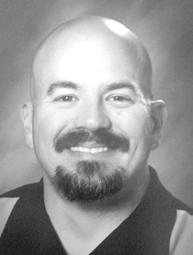
Once again, I would like to congratulate Branden Hansen and his entire planning team for a job well done at the 2015 All-State Conference Their tireless efforts made for another successful event with many informative sessions, and inspiring performances .
It was during this event that some changes occurred to the infrastructure of OMEA of which you need to be aware (with more changes to come) During our board meeting, a motion was adopted to align OMEA’s eligibility requirements with the OSAA regarding the solo championship . While this does cause concern for many individuals, the overall impact on programs has been negligible The short answer for the reason to adopt this amendment is that it standardizes the language between the two Associations This means that administrators and athletic and activity directors now have a better understanding of how our qualifying events work It also brings most of the questions regarding eligibility under local control between music teachers and their administrators . As always, if you have questions regarding this do not hesitate to email me at tom_muller@ddouglas k12 or us
OMEA is also looking at the endorsement and adoption of music standards for Oregon During All-State, I was approached by a group of Music Coordinators and was asked about OMEA’s position on the National Core Arts Standards (NCAS) There has been much behind-thescenes work on developing standards, but adopting Oregon-specific standards has recently hit an impasse The group of Coordinators has requested that OMEA adopt the NCAS You can review them here: http://nationalartsstandards org/ Many of the Coordinators have begun the work of implementing these already and feel that a unified
stance throughout Oregon is the best for our music programs . Some individuals had the opportunity to discuss the national standards with the NAfME President during the All-Northwest Conference and were able to receive further clarification The OMEA board will be addressing this topic during our Spring meeting and will update the membership with the decision This decision will also be shared with the Oregon Department of Education, but all standards are voluntary and can be adapted by individual districts to meet their needs
OMEA is also going to host its inaugural State Ensemble Championship This year marks the first of a two-year pilot program of this event A huge thank you to Dan Judd for taking on and organizing this event for our students There are many moving parts when trying to chair an event such as this, and his efforts are to be commended . After this year, he and the Executive Board will look at ways to improve and possibly streamline it for 2016 At the conclusion of the 2016 event, the board will look at the longevity of the event .
While the only constant in life is change, these changes are good for the health of music education in Oregon . My goal is to have as much alignment within OMEA and with outside agencies so we as a profession are not viewed as extraneous, but as a vital part of students’ overall education By becoming more unified it gives the impact that we all know music makes on children harder to deny, and strengthens our cause

Although the roots of the division between “right brain” and “left brain” academic subjects began back in the Sputnik era (1957), it was not until the STEM (Science, Technology, Engineering, Mathematics) movement of 2001 that this controversy became sharply formalized The gulf between scientific disciplines and arts, both of which were inextricably linked in ancient times in the quest of finding truth and beauty, grew further as the increased funding provided for teaching STEM disciplines at the federal and state level suggested a predilection for STEM subjects rather than arts
The test scores of PK–12 students who took the National Assessments of Educational Progress (NAEP) test have driven the rationale for an increased emphasis on STEM education . For the past twenty years this test has indicated that the U S is failing to compete with other countries when it comes to student performances in STEM subjects (Finkel, 2012) . This, as advocates of STEM education often point out, may have dire consequences on the economic and political power of the U S in decades to come . In order to regain U . S prominence in the near and distant future, the Obama administration’s signature education reform, Race to the Top, invested $4 . 35 billion into grants that enabled states that received this grant to put their best efforts into bringing all students to the highest standards of achievement Many states received “bonus points” for applications that stressed STEM instruction
While the sense of urgency attached to STEM education may be understandable, the rightfulness of placing so much emphasis on only four isolated disciplines has been questioned by those who recognize benefits that other subjects, particularly the arts, bring to STEM education The book, Meeting Standards through Integrated Curriculum (Burns & Drake, 2004), offers numerous reports on the positive impacts of an integrated curricular approach on test scores of students in STEM disciplines Additionally, it is suggested that the future economy of the U S depends not only on preparing students in STEM disciplines, but it also depends on the U S ’s ability to be a leader in creativity White (n d , cited in Daugherty, 2013) noted that STEM is based on skills that generally use the left hemisphere of the brain where logic resides, while the arts engage the right half of the brain where creativity and innovation are fostered . White expanded on this notion and implied that the combination of STEM and arts education could provide a curriculum that is the most supportive of innovative leadership . O ther similar studies have led many to suggest that STEM should be amended to STEAM, where “A” stands for Arts (Wynn and Harris, 2012)
Music, as one of the eight arts, is only anecdotally mentioned in STEM vs STEAM studies For example, Nobel Laureates in the sciences tend to be 25 times more likely than the average scientist to sing, dance or act, 17 times as likely to be artists, 12 times more likely to write poetry or literature, and four times more likely to be musicians (Root-Bernstein & Root-Bernstein, 2013) Gershon and Ben-Horin (2014) discussed the power and possibilities that the process of music-making holds for
inquiry-based science education While a number of studies provide evidence for positive impacts of arts on student achievement in STEM disciplines, there is still no inquiry on how STEAM benefits arts education Common sense informs us that such inclusion could provide more funding and support for the arts However, the question, “shall arts be valued and supported in our schools for their intrinsic values and for what arts bring to human lives: a sense of meaningfulness, joy of aesthetic expression, and the development of a unique type of intelligence” remains open for dutiful consideration The proposition that arts are fundamental to human beings for their own sake aims to re-invigorate thinking about the value of the arts in education that are not based on any utilitarian objective, but rather on understanding that arts are fundamental to humanity and its prosperity

Since the 1950s, American music educators have embraced several tenets found in Educational Psychology to facilitate the teaching and learning of music, most notably: Behaviorism (Skinner), Cognitivism (Bruner), Humanism (Maslow), and recently a Socio/Biological model (Rauscher) Additionally, since the 1970s at least three philosophical views have influenced music education in the U . S : “Aesthetic” philosophy (Reimer), “Praxial” philosophy (Elliot), and the “Inclusive” philosophical view (Jorgensen) Those theories contributed to shaping the music education system in the U S . into one of the most viable systems in the world For the purpose of this article, however, only theories and philosophies that contributed to strengthening views on arts and music as their own entities that are equally valued and important to any other academic subjects will be briefly reviewed
Jean Pestalozzi and “whole person” education
Jean Pestalozzi (1746–1827) was a Swiss pedagogue and educational reformer whose theoretical and practical work not only overcame illiteracy in 18th-century Switzerland but also made a lasting impact on education around the world in the centuries to come In his book The Education of Man: Aphorisms, Pestalozzi (2007) explained his idea— revolutionary for its time—of educating the whole person . He also coined the well-known “Three H” motto: “learning by head, hand, and heart ”
This motto found its direct application in Boston public schools when a special committee, appointed by the Boston school board, proposed that music was a benefit for students intellectually, morally, and physically Continuing well into the 20th century, Pestalozzi’s “Three H”
motto was transformed into three taxonomies of educational domains: the cognitive (head), the psychomotor (hand) and the affective (heart) . These still today guide educators in the development of learning objectives that aim to address the holistic student
In addition to his seemingly timeless idea of education which molds the “whole” person, Pestalozzi was introduced to American music instruction through eight principles of learning that applied to teaching music: teach sound before symbol; observe by hearing and imitation (rote); teach one thing at a time; master each step before going on (sequential learning); practice before theory; teach from the elements of articulated sound (that is, musical elements); use childcentered approaches with little assistance from the teacher (teacher as facilitator); let the child find out answers and correct answers (discovery learning) A century and some years later, Pestalozzi’s idea of “whole person” education found its reflection in the humanistic theories of Abraham Maslow who viewed arts as the vehicle to realizing humanity’s highest potentials .
American psychologist Abraham Maslow (1908–1970) is best known for his humanistic interpretation of motivation Unlike many psychologists of his time who based their theories on analysis of problematic lives, Maslow focused on positive qualities of people His studies of successful people, including Albert Einstein, led him to believe that all humans have a need for self-fulfillment, which he termed “self-actualization ”
In order to reach this highest level of existence, in his book Towards a Psychology of Being, Maslow (2014) suggested, people are intricately motivated to advance their position on a hierarchy of needs He called the four lower-level needs—for survival and safety followed by belonging and self-esteem— deficiency needs When these needs are satisfied, the motivation to fulfill them decreases On the other hand, he labeled higher-level needs—intellectual achievement, aesthetic appreciation, and finally, self-actualization— being needs When these needs are met, motivation does not cease; indeed, it increases to seek further fulfillment
Maslow viewed the study of arts as a vehicle to “self-actualization,” as arts activities challenge the highest intellectual potentials He suggested that through the pleasure that accompanies music studies, students can experience a full emotional life Many tenets of aesthetic education are based on these humanistic principles and are often echoed in the writings of Bennett Reimer .
Bennett Reimer (1932–2013) was an American music education philosopher and scholar whose seminal work titled A Philosophy of Music Education (2002) marked the beginning of an aesthetic view on music education Before Reimer, justification for music education was based
on descriptors such as “building character,” “instilling confidence,” “team effort,” and a variety of similar non music-oriented reasons, all of which do not provide coherent frameworks for music education, nor do they provide music a unique place in curriculum
Reimer proposed that music is the “basic mode of cognition” and that it is distinguished from other modes of cognition by its non-discursive qualities He believed that music should be taught because it develops the form of self-knowledge or intelligence that is “unavailable in any other way” (p . 28) . He proposed that it develops aesthetic sensitivity through deepening and refining the mental sensation of feelings According to Reimer, development of this mode of intelligence, “is essential if education is to help children become what their human condition enables them to become” (p 85)
General music classes, with their focus upon perceptive listening to a wide range of musical works, are where music education should place most of its emphasis . Performance, per sé, according to Reimer, is not a desirable way to educate students in music, as such orientation lessens development of aesthetic sensitivity
Another American music education philosopher, Reimer’s student, David Elliot, on the other hand, believed that music should be learned through music making and that music making should precede music listening He agreed with Reimer that music is a cognitive human activity but it is also “something that people do” (p 39) and in his book Music Matters (2014) he combined the two components under the umbrella of praxial music education . Doing music, according to Elliot, has two interdependent manifestations: music listening and music making, both of which revolve around a form of procedural knowledge called “musicianship ” Such knowledge does not separate action and thought; indeed, the actions of making and listening to music involve thinking, or cognition, which is manifested in and within those actions, not prior to or apart from those actions Simply stated, according to Elliot, music making is music action
Performance and authentic music making such as improvisation, composing, arranging and conducting, informed and demonstrated through musicianship, should be the primary means of teaching music as they involve multidimensional data and provide a form of intelligence that is unavailable in any other way, even through other arts For that reason, Elliot says, “music making is valuable and significant in itself because it propels the self to higher levels of complexity” (p . 122) .
If the past informs the future, music education in the U . S will continue to be influenced by ever-changing educational policies, theories and
Continued on page 8
movements; STEM vs STEAM being one of them While giving arts and music an independent and equal position within PK-12 curriculum may at this point be beyond the control of the music education community, music educators do have the means to deepen their understanding of the critical position of arts and music education in the school curricula . Reading and revisiting some of the most important theories and seminal books that shaped music education in the U S . during the past 150 years can help remind us why the U S is one of the strongest and most vital music education systems in the world That way, when the time comes for yet another educational policy review, music educators may be better prepared for informed action that will keep providing music education with its rightful place among other core subjects in American schools for the greatest benefit to all students and our nation


Burns, R C , & Drake, S M (2004) Meeting standards through integrated curriculum Alexandria, VA: American Society of Curriculum Development
Daugherty, M K (2013) The prospect of an “A” in STEM education . Journal of STEM Education, 14(2), 10–14
Elliott, D J , & Silverman, M (2014) Music matters: A philosophy of music education (2nd edition) New York: Oxford University Press
Finkel, E (2012) What can U S schools learn from foreign counterparts? District Administration Retrieved February 15, 2015, from http://www districtadministration com/article/what-can-us-schools-learn-foreign-counterparts
Gershon, W S , & Ben-Horin, O (2014) Deepening inquiry: What process of music making can teach us about creativity and ontology for inquiry based science education International Journal of Education & Arts Retrieved February 14, 2015, from http://files eric ed gov/fulltext/EJ1045934 pdf
Maslow, A H (2014) Towards psychology of being Floyd, VA: Sublime Books
Pestalozzi, J H (2007) The education of man: Aphorisms. (2nd edition) New York: Philosophical Library
Reimer, B . (2002) A philosophy of music education: Advancing a vision. (3rd edition) Upper Saddle River, NJ: Pearson
Root-Bernstein, R . S . & Root-Bernstein, M M (2013) The art and craft of science . Educational Leadership, 70(5), 16–21
Wynne, T & Harris, J (2012) Toward a STEM + arts curriculum: Creating the teacher team Art Education, 65(5), 42–47
The Center for Community Music at Oregon State University is proud to offer...

Julie Scott (Pedagogy) is Associate Professor of Practice in Music Education at Southern Methodist University and past president of AOSA.

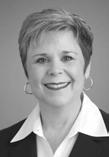
Ben Torres (Movement and Recorder) teaches K-6 Music at Brentfield Elementary in the Richardson ISD in Dallas, Texas.

Julie Beauregard (Course Director) is General Music Education Specialist and Director of the Center for Community Music at Oregon State University.
July 13-24, 2015
Monday - Friday • 8:30 a.m. - 5:00 p.m. in beautiful Corvallis, Oregon
Orff Schulwerk is an approach to music education based on the work of pedagogues and composers Carl Orff and Gunild Keetman. This course is particularly relevant for elementary general music teachers, providing lesson strategies and materials that can be immediately implemented in the classroom.
• Experiential activities explore music through singing, movement, rhythmic speaking, percussion instruments, recorders, and improvisation.
• Develops foundational knowledge and pedagogical skills in the Orff Schulwerk approach.
• Special topics include folk dancing, singing games, history of Orff Schulwerk, and world music.
Registration and more information:
liberalarts.oregonstate.edu/cfcm
2016 OMEA State Conference January 15-17, 2016 • Eugene Hilton and Conference Center
NAfME member submitting proposal
NAfME number
Address City State Zip
Work phone
Email address
Session title
Please describe the proposed session
Cell phone Home phone
Who is the intended audience(s) for the session? [ ] Elementary [ ] General [ ] Band [ ] Choir [ ] Orchestra [ ] Collegiate [ ] Other Will a demonstration or performance group be needed for the session? [ ] Yes [ ] No
Could the demonstration group be one of the groups invited to perform at the conference? [ ] Yes! [ ] No
If you are not the clinician, please provide the name, address, and school or industry affiliation for your suggested clinician:
If you are suggesting another person for this session, would you be willing to preside or organize the session? [ ] Yes [ ] No
Note: All music educators appearing on OMEA programs must be members of NAfME and pay their own expenses to register and attend the conference . Oregon members will not receive honoraria or expenses Expenses and honoraria may be available to clinicians who must travel longer distances
Forms must be postmarked by June 30, 2015 Please send completed forms to OMEA, PO Box 1235, La Grande, Oregon, 97850 or email to admin@ oregonmusic org Questions? Please send us an email
2016 OMEA State Conference January 15-17, 2016 • Eugene Hilton and Conference Center
NAfME member submitting proposal
NAfME number
Address City State Zip
Work phone Cell phone Home phone
Email address
Name of performance group
Ensemble category (HS Band, MS Jazz Choir etc )
Detailed description of ensemble
Would you be willing to be a demonstration group for a clinician? [ ] Yes [ ] No
Specific equipment needs (piano, percussion, stands, mics, etc )
If invited to perform, are there any special performance needs that OMEA needs to be made aware of?
If you are suggesting a group for this session, and are not the primary clinician/conductor, would you be willing to preside or organize this session? [ ] Yes [ ] No
Note: All music educators appearing on OMEA programs must be members of NAfME and pay their own expenses to register and attend the conference . Oregon members will not receive honoraria or expenses Expenses and honoraria may be available to clinicians who must travel longer distances
Forms must be postmarked by June 30, 2015 Please send completed forms, along with a recent representative recording of the group to OMEA, PO Box 1235, La Grande, Oregon, 97850 or email to admin@oregonmusic org Recordings may be submitted as wav or mp3 files and stored on a CD or portable digital storage device (thumb drive, etc .) Questions? Please send an email .

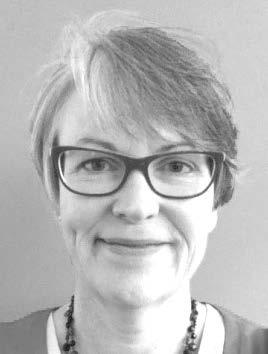 May General Music Chair
May General Music Chair
As I write this journal article, I find myself in an interesting space . I was at a loss for a topic until I spent some time with a good friend this past weekend It is amazing sometimes how a little “retail therapy,” and some outstanding weather, can give your thoughts a re-set
I am coming to the close of a 34-year career in education I have been blessed to be able to keep a piece of my job grounded in my arts roots as a music coordinator while traversing the slippery slope of administration Because of this career moment, I have been cleaning out some files in my shop and decided to purge some of my old elementary general music lesson plans I had been holding on to these “in case I might need them,” for some time now and figured it was probably the right time to let them go I n this filing cabinet, I also found the original units I had designed for my first “job” in one of my music education classes from the University of Portland 34 years ago There was a file on “Music Booster Clubs,” one on “How to Work with your Administrator, (I especially enjoyed that one),” “Designing a great Half-time show,” and “Elementary Music: How to survive it…” WOW!! What do you mean, how to survive it? Why wasn’t it titled, “Elementary Music: The most important work you can ever do?”
Spending 17 years teaching various incarnations of general music prepares you for many things in life It gives you patience; it builds your memory, and provides you with some of the most amazing stories you will ever tell . Where else could you prepare lessons on composition, music appreciation, music history, rhythm, harmony, reading, and the most important musical trait, character? You teach children how to read You support students to try things that they could never try

anywhere else You tell stories and build relationships with communities of people Most importantly, you are entrusted with building a foundation for children to explore music and the arts You get to help shape the human condition
General music is important What we need to remember is that we can only influence and shape that which we believe has merit and meaning . Write those rubrics, set those learning targets, and continue to wow the administrators that set foot in your rooms with your abilities to create authentic assessment This is the most important work YOU will ever do…
• Making music can help reduce job burnout and improve your mood, according to a study exposing 112 long-term care workers to six recreational music-making sessions of group drumming and keyboard accompaniment (As published in “Advances in Mind-Body Medicine”) Engaging in playing music reduces depression Recent research with long-term care workers showed reduced depression (21 8 percent) six weeks after the completion of a music-making program consisting of one hour per week (Source: A 2003 study conducted by Trip Umbach Healthcare Consulting, Inc .) .
Recreational Music Making (RMM) has been scientifically proven to help the U S . workplace . Every worker can participate in RMM . There are no physical limitations or requirements


• Employee stress is expensive for companies and widespread Research shows that the economic impact is estimated at $300 billion each year (Source: New York Times) Experts claim that 60 to 90 percent of doctor visits involve stress-related complaints
• Engaging in RMM reduces stress RMM has been shown to reverse the body’s response to stress at the DNA level (Source: Dr Barry Bittman)
• Depression is widespread in the workforce and is expensive for companies The economic impact of depression in the workplace is estimated at $34 billion annually—$11 billion for treatment, $11 billion in decreased productivity, and $12 billion in absenteeism. Depression affects about 19 million people, 70 percent of whom are in the workforce (Figures are according to Braun Consulting News)
• Engaging in RMM reduces depression Recent research with longterm care workers showed reduced depression (21.8 percent) six weeks after the completion of an RMM program consisting of one hour per week. (Source: A 2003 study conducted by Trip Umbach Healthcare Consulting, Inc .)
• RMM can help companies reduce turnover, saving them millions . The research with long-term care workers showed an 18.3 percent overall reduction of employee turnover by implementing an RMM program. The total annual savings was projected at $1 46 billion















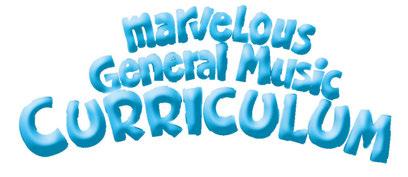












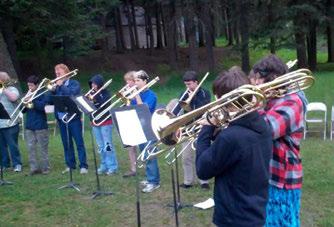
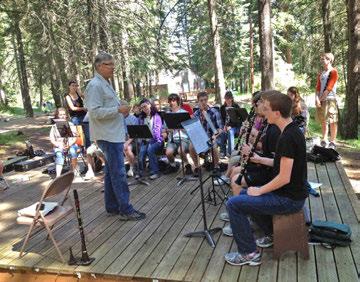
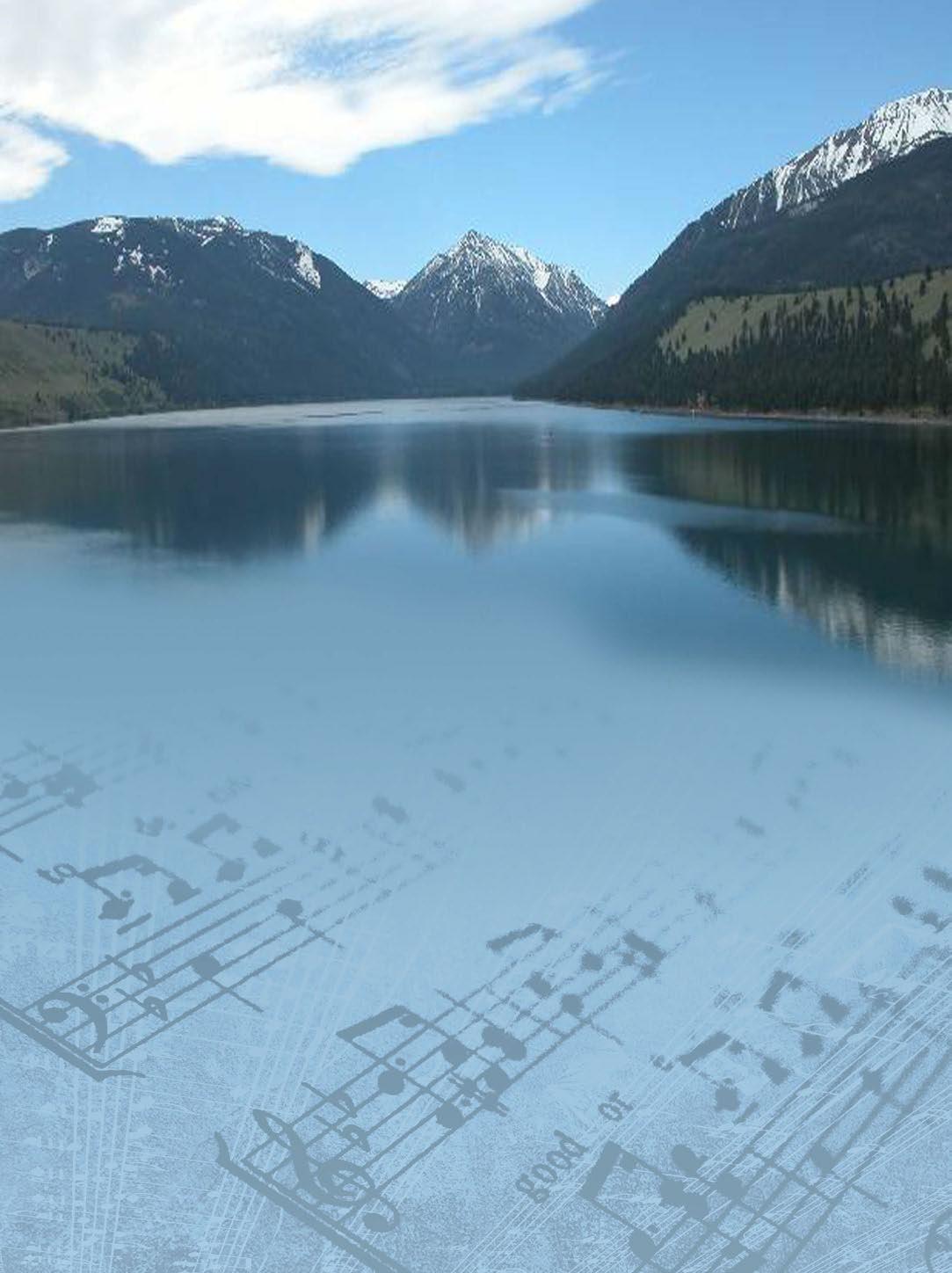

Nowhere will you find a better Brass or Woodwind camp for your middle and high school students! These camps offer a unique experience and intense instruction from members of the Northwest’s professional orchestras. Camp includes student performances and FUN in the heart of the Wallowa Mountains.
Brass @ Wallowa Lake
June 14 - 20, 2015
$470 per camper
Woodwinds @ Wallowa Lake
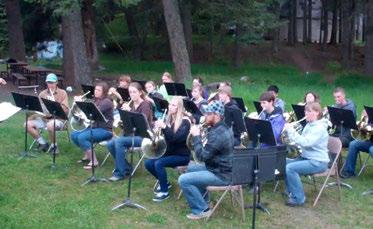
July 26 - August 1, 2015

$495 per camper
A day at Camp includes:
Master Classes
Music Theory
Music History
Mixed Ensemble
Supervised individual practice
Rhythm through movement
Recreation & Activities
Great food!
French Horn
Two-Camp Special attend BOTH camps for $795. This offer is good for French horns only!
Visit our website: musiccampsatwallowalake.com
Music Camps @ Wallowa Lake P.O. Box 636 La Grande, OR 97850 Woodwind Camp Phone: 541-663-0326
Camp Phone: 778-867-0353 (International.Call.email.preferred)
We invite you to explore the premiere educational institution of music and dance in the Pacific Northwest. The University of Oregon offers a large full-time, in-residence music faculty, modern rehearsal and performance venues, and more than thirty performing ensembles.

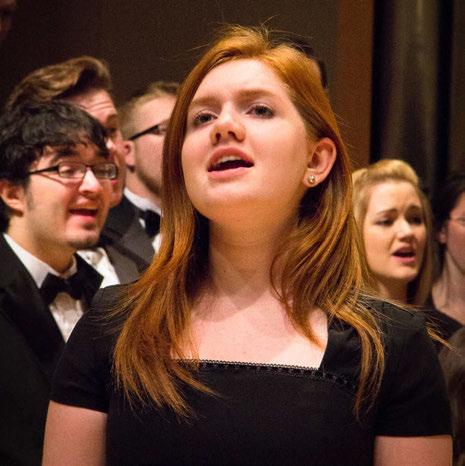

Music may help some people relax when they’re trying to concentrate But it doesn’t help them remember what they’re focusing on, especially as they get older
That’s the finding in a new Georgia Institute of Technology study that challenged younger and older adults to listen to music while trying to remember names College-aged participants had no problems -- the music didn’t affect their performance But the older adults remembered 10 percent fewer names when listening to background music or musical rain as compared to silence The findings could have implications for senior living centers and people who prefer to hold meetings away from the office .

The Georgia Tech researchers wanted to replicate everyday life because music and background noise are everywhere Their study tested the effects on associative memory, which includes the ability to put a face with a name and remember it
Study participants looked at a series of faces and names and were asked if the person “looked like” the assigned name The faces were shown again a few minutes later Participants had to determine whether the name and face combinations were the same as before Sometimes people did the test in silence O ther times they listened to musical rain or non-lyrical rock music, including lesser-known songs from Eric Clapton, Jefferson Airplane and Rush
“Both age groups agreed that the music was distracting,” said Sarah Reaves, the Georgia Tech psychology graduate student who led the study “But only the older adults struggled while it was playing in the background ”
Reaves and her advisor, School of Psychology
Assistant Professor Audrey Duarte, linked the results with the well-known cocktail party effect, a phenomenon that allows people to solely focus their attention on one conversation even while surrounded by multiple conversations or loud music
“Older adults have trouble ignoring irrelevant noises and concentrating,” says Duarte, who oversees Georgia Tech’s Memory and Aging Lab “Associative memory also declines with age As we get older, it’s harder to remember what name went with a face or where a conversation took place ”
Reaves notes that the study could help workers in assisted living centers as they plan activities .
“They should be mindful of their surroundings Maybe employees should turn off music during learning activities or hold them in a quiet room,” she said “Similarly, older adults who struggle to concentrate while meeting with co-workers at a coffee shop, for example, should schedule meetings in quieter locations When people get lost while driving, it’s probably best to turn off the radio ”
S Reaves, B Graham, J Grahn, P R abannifard, A Duarte Turn Off the Music! Music Impairs Visual Associative Memory Performance in Older Adults The Gerontologist, 2015; DOI: 10 1093/geront/gnu113
Georgia Institute of Technology “Terrible at remembering names? Blame it on the music, not the memory.” ScienceDaily 11 February 2015 http:// www sciencedaily com/releases/2015/02/150211153925 htm
Authenticity in instruction of world musics is a challenge for music educators . While, as a profession, we intend to broaden our students’ musical knowledge and skills, and have increased efforts toward including diverse repertoire in our classes and ensembles, music educators still have a number of valid concerns when incorporating world musics into curricula These include: (1) lack of in-depth knowledge of, or experience with, particular musical cultures; (2) insecurity with foreign musical techniques, repertoire, and performance practice; (3) cultural misrepresentation or appropriation; and (4) uncertainty about appropriate pedagogical approaches My aim in the subsequent discussion is to alleviate authenticity-related concerns, empowering you to include world musics in your teaching .
Being an expert in every musical culture is not a requirement of teaching world musics . Realistically, no one can achieve that type of omni-cultural mastery Rather than development of expertise, think of yourself as a liaison to students’ learning about musical cultures In that role, your responsibility is to develop a fundamental understanding of the culture from which a particular music derives so you can provide context to your students Include explorations into geography, language, other art forms, religious practices, food, and history in addition to musical information such as instrumentation, timbre, social contexts of music making, the role of improvisation, and characteristics of form, rhythm, melody, and other structural elements Again, remember that you are not going to become an expert, knowing this culture and its music inside and out, but you will become knowledgeable You will become a resource for your students in providing preliminary context to the music under study, and could even provide opportunities for students to assist you in the research endeavor – perhaps as a class project or independent study .
This exploratory stage can be aided immensely by your school or community librarian A host of online resources such as Smithsonian Folkways (Smithsonian Institution, 2015), which has a “Tools for Teaching” page complete with lesson plans and audiovisual resources, are publicly accessible (http://www .folkways si edu/tools-for-teaching/ smithsonian) People who are knowledgeable about various musical traditions can also be found in your communities and classrooms Invite your students and their family members to share their musical and cultural knowledge with you and your other students Locate cultural centers in your region to identify musicians Ask to interview individuals native to a foreign musical culture, or to take lessons from them to gain experience making their music Our global neighbors are often closer than we think! Avail yourself of these human resources
Insecurity With Foreign Musical Techniques, Repertoire, and Performance Practice

Western norms emphasize precision and technical mastery in musical performance, so it’s only natural that we apply those norms to other musical cultures While such elements are certainly considered important – particularly technical mastery – in most musical cultures, the extreme emphasis that musicians in Western musical cultures place on them is culturally specific Elsewhere, many other considerations such as style, energy, and collaboration are given priority During research and investigations into the musical culture of interest to you, do your best to glean what seems to be most important to the people making the music rather than figuring out how that musical culture fits into your (Western) conceptualization of music Each culture’s music-making practices are specific and intimately linked to other societal factors, so understanding the music in its cultural context is key to authenticity When teaching your students, make sure to convey what you have learned in this regard about the particular musical culture Also consider how a focus on such elements might strengthen your students’ musicianship skills and concept of the relationship between music and culture (including their own)
Additionally, I encourage you to utilize audiovisual resources to demonstrate your discoveries, and to provide models of performance practice and expertise . You may not be a master taiko drummer, yoik singer, or mountain dulcimer player, but technology can bring masters right into your classroom! All of the listening and watching you do will also increase your familiarity with the musical culture . Your future teaching about these topics will become deeper and more nuanced as your expertise grows But allow yourself to be a novice first (as uncomfortable as that might be), and bring your students along on your journey of discovery
This is an ethical concern that deserves thoughtful consideration We want to be equally respectful of all peoples’ musics in the classroom, so representing a culture and its music accurately is an important goal . If you have followed the suggestions outlined so far, you are on track to avoid misrepresentation and appropriation Another essential step toward this goal is selection of repertoire, which can present its own challenges Many teacher texts include materials from multicultural sources However, some are “inspired by,” “in the style of,” or otherwise Westernized to the extent that the music is no longer culturally representative, and other publications sometimes blatantly modify “multicultural” and “folk” repertoire . Materials that pair sociocultural information with musical transcriptions and/or audiovisual recordings offer the most promising starting point for an educator, as
such information can usually be verified (or debunked) to some extent via a quick internet search or library visit If possible, it is ideal to check with a master musician from the musical culture to find out if materials are accurate; someone who has first-hand knowledge of the tradition (e g , a Westerner who has studied in the culture or with an indigenous master musician) may also provide a solid resource . Being mindful of texts’ publication dates are also wise, as is consideration of how (and by whom) musical materials were collected The more recent the publication (1990s or later), the better Materials supplied directly by members of a musical culture, or those gathered by ethnomusicologists or scholars who acknowledge the specific source of their information are the most trustworthy in terms of authenticity
Since the classroom itself is a foreign context for most musics (including Western art, folk, and popular forms), world musics need to necessarily be adapted for instruction in a K-12 music class or ensemble Depending on students’ capabilities and available musical resources such as instruments, you may need to make slight modifications to world musics to make them teachable in your classroom These modifications should maintain the structural integrity of the music and reflect instructional practice of the musicians within that culture
A modification may be as simple as displacing a pitch by an octave, or as substantial as eliminating an entire section of a piece These changes should not include anything as drastic as a rearrangement of harmonic structure or removing a central rhythmic figure A native musician from the musical culture should still be able to recognize the music after modifications are made – imagine that as your benchmark when making modifications If alterations are too substantial and the “new” version bears little likeness to the original, authenticity has suffered and the endeavor will do an educational disservice to students .
Whatever level of accommodation you employ, remember that traditional teaching and learning of almost all musics worldwide occurs through aural/oral and kinesthetic/experiential means These are the most appropriate instructional methods with which to bring them into Western classrooms Any notational resources should serve as memory aids for the teacher, not as teaching tools for your students Starting with the ears, the body, and the voice honors authentic instructional and performance practice of the vast majority of non-Western musical cultures, and strengthens students’ aural musicianship skills, memory, and focus on collective music making This process also brings dimension to your instruction through the use of multimodal learning
Through these methods educators employ World Music Pedagogy, in which equal consideration is given to the “original culture of the music” and the “instructional culture” of the educational institution in which the current pedagogy is enacted (Campbell, 2003, p 27)
This discussion has dealt with authenticity in world music instruction, but there is much more to the issue than can be treated in a single article If you have an interest in exploring further, there are a number of publications that address authenticity and other intersections of ethnomusicology and music education, some of which also include excellent teaching resources A few of note are Solis’ (2004) Performing Ethnomusicology: Teaching and Representation in World Music Ensembles, Anderson and Campbell’s (2010) Multicultural Perspectives in Music Education, and Cornelius and Natvig’s (2011) Music: A Social Experience. Being concerned about authenticity is, I believe, a precursor to teaching diverse musics well Concern indicates that you value honoring people, their culture, and their music, and that you are likely to apply the suggestions made above to avoid musical, cultural, or pedagogical misrepresentation . Concern about authenticity should act as a catalyst for learning (for you and your students), not as a barrier to inclusion of world musics in your curriculum Remind yourself that, while striving for authenticity is important, it can never be fully achieved in a Western classroom Sharing a particular world music and related socio-cultural information is far more important than working toward the impossible goal of replicating an exact enactment from the music’s place or time of origin Anecdotally, I can share that the master musicians from numerous musical cultures with whom I have had the privilege to study have consistently expressed that sentiment to me So my advice is to do your best to make quality adaptations, use your resources wisely, and introduce your students to the wide world of musics
Anderson, W M , & Campbell, P S (Eds ) (2010) Multicultural perspectives in music education. Vols . 1-3 L anham, MD: National Association for Music Education/Rowman & Littlefield Education
Campbell, P S (2003) Teaching music globally: Experiencing music, expressing culture. New York: Oxford University Press
Cornelius, S & Natvig, M (2011) Music: A social experience. Boston, MA: Pearson.
Solis, T (Ed ) (2004) Performing ethnomusicology: Teaching and representation in world music ensembles. Oakland, CA: University of California Press
Smithsonian Institution (2015) Smithsonian Folkways: Tools for Teaching Retrieved from http://www folkways si edu/tools-forteaching/smithsonian
This is my first report as OMEA’s Advocacy Chair and I hope it will help orient you to our organization’s advocacy strategies and inspire you to further develop yourself and your community of advocates
Our members have wisely elected an Executive Board that is incredibly supportive of building OMEA’s advocacy capacity Because of their leadership, OMEA already has several programs in place to support advocacy, such as the Oregon Music Advocacy Toolkit (https://www oregonmusic org/Advocates .html) on the OMEA website and the OMEA Special Grant Program There are also a few new projects we’re starting this year
My goal as Advocacy Chair is to recruit and develop an Advocacy Committee that is capable of sustaining the long-term projects necessary to make noticeable improvements in student access to high-quality music education The Committee is recovering from a gap year, so my term started this fall with a telephone listening tour of District Chairs and Area Chairs to determine our areas of need as well as areas of potential energy The listening tour is still underway, but several important objectives have already been accomplished because of it, the most important of which is determining that the Advocacy Committee will be structured in three parts: (1) Music Coordinator’s Group, (2) Advocacy Coaches, and (3) OMEA Advocacy Leadership Force This trio of subcommittees will support the advocacy projects that our organization needs to complete annually .
There are many things to consider when advocating for quality music programs: equipment/fees/budgets, scheduling and staffing, standards/articulation/assessment, access to training and professional development, and program promotion At this stage in our statewide advocacy development, we are collecting data on student access to music education (i e , courses taught by certified music instructors) in the form of Full-Time Equivalent (FTE) staffing reports from our Music Coordinator’s Group (a professional learning community of music coordinators/leaders/administrators/supervisors/TOSAs — official or unofficial, paid or volunteer) and through our OMEA Advocacy Leadership Force (a voluntary team of music supporters — teachers/ parents/students/community members/vendors that will assist with advocacy research and outreach) Both workgroups are open for new participants and your energy is needed; please contact me to learn more and to join a group
Our long-term goal is to see the total FTE for certified music instructors increase around the state and to measure the effectiveness of OMEA advocacy projects. Once we have completed our first statewide census and we have a baseline, we will be able to detect changes in overall programming in each locale and better measure the success of our advocacy efforts . The census will also serve as valuable factual data to inform school board members and legislators as our advocates build relationships with them
OMEA Advocacy is also developing an advocacy contacts database and a team of Advocacy Coaches who have volunteered to mentor other advocates Our hope is that OMEA members in each public school district and private/alternative school community will identify at least one parent, teacher, and community member who is interested in advocating at the local level (School Board/ Administration and Legislators) Our OMEA Advocacy Leadership Force will assist with developing the contacts database and our Advocacy Coaches will serve as first responders when advocacy contacts need support in creating their local coalition or responding to program cuts
The following educators have graciously volunteered to serve as Advocacy Coaches Please contact one of them or myself immediately if you hear that your school/district may be cutting music programs
OMEA Advocacy Coaches
Alexandra (Andie) Andeen oboeduets@gmail com
Frank Petrik mr fpetrik@gmail com
Tracy Ross ross@4j lane edu
Dijana Ihas dihas@pacificu edu
OMEA Advocacy Chair
Jennifer Mohr Colett

oregonmusicadvocacy@gmail com
The Advocacy Coaches will be able to listen to your particular advocacy situation and provide advice They will be in communication with me and each other as we coordinate a statewide response and access support from the OMEA Executive Board/NAfME as needed If you have background in advocacy and would like to serve as an Advocacy Coach, please let me know .
In closing, here is a list of recommended steps for developing your professional skills as an advocate:
• Follow the Oregon Music Advocacy Facebook page for advocacy updates and links to recent research and NAfME initiatives/supports .
• Read Music Advocacy: Moving from Survival to Vision by John Benham . Buy a copy for yourself and a parent .
• Visit the Oregon Music Advocacy Toolkit (https://www oregonmusic org/Advocates html) for some great ideas and excerpts from Benham’s book
• Read/revisit past OMEA Journals—they are filled with information and advice about advocacy .
• Follow the NAfME Advocacy Groundswell blog (http://advocacy nafme org/about/) and join the NAfME Broader Minded campaign (https://www broaderminded com/)
If you find yourself in an advocacy crisis:
• Contact an OMEA Advocacy Coach to get support and to let us know what’s happening
• Leverage Parent Power. When teachers advocate in isolation, it can look like they are just trying to save their own job, but when parents advocate, then it is more directly about the students, and the whole conversation becomes more effective Teachers can support parents by providing information about the program and professional research Teachers can also work with administrators to help solve scheduling and budget problems
• Use existing parent-teacher structures, such as Boosters to start a local music coalition. Know that 501(c)(3) booster groups can advocate . They cannot endorse candidates or ballot measures, but they can distribute impact statements and talking points, organize rallies, and legally spend up to 5% of their operating budget on advocacy projects

• Understand the role of your local school board and who the members are (and when they are elected), the role of the administrators and who they are, how the teachers’ union works with the administration, and who makes decisions (and when) .
• Strike while the iron is hot! If you are in an advocacy crisis, call an emergency meeting to discuss the impact on the program and pass around a clipboard asking for names, email addresses, *phone numbers* (this one is important), and their relationship to the school/district . Create an advocacy contacts database and follow up via e-mail and personal phone conversations to determine their motivation for being part of the group and what each person might be able to contribute Start an e-mail list or a Facebook group to keep everyone organized
• Be visible and be numerous. Have your coalition members wear the same color attire and show up in large groups to public meetings
• Share facts and research. Keep all communications high-character
• Build long-term relationships. Arrange a coffee meeting with a School Board member Make your goal for the first meeting to listen a lot, to share a little, and to get to the next meeting, where you can continue to build the relationship by listening and talking a little more
• Monitor your advocacy capacity carefully as you go and be mindful of mission creep
• Stay focused on the subject/program for which you are advocating. John Benham has some golden advice: as you advocate, you will be told you are a “special interest group”—and that is correct, you are a special interest group—but your “special interest” is that every child receive a complete education that includes music as a core subject You may be tempted at times to broaden your focus; know that if you do, you will likely be told your goals are impossible because they are too broad Do not get sidelined! It really is better to stay specific
• Your advocacy coalition will be made up of volunteers Support them and treat them well
• Sustain your involvement and learn as you go. Find out how you can help those who have the power to give you what you want; the key to winning may surprise you .
• Contact OMEA if you need help with a specific advocacy project; our organization has a special grant program that may be able to assist you
Ilove mid-January when I can leave the cold and grey Pacific Northwest and head toward the warmth and clear skies of Anaheim, California for the annual National Association of Music Merchants (NAMM) convention I always look forward to all the new and exciting developments heading our way as music educators in music technology . This year, I was not disappointed
You may have heard that MakeMusic Inc (the company that created Finale and SmartMusic) relocated to Boulder, Colorado to merge with a company called Peaksware . Some positions at MakeMusic were eliminated, and a number of employees who received offers to join the new venture in Boulder chose not to make the move, precipitating the rumor that the company had gone out of business Not true! I met with Peaksware president Dirk Friel and the company’s marketing director Sonia Bertek, who reassured me that things are moving forward Peaksware develops software platforms that connect creators, instructors, and performers and helps them set specific goals You get expert instruction that can help both user and software perform at the highest levels Rest assured that Finale and Smart Music are ongoing, supported products
Software Apps
I found three smaller software/app companies that offer promise for the music education market Imitone ($25) translates sound into MIDI, the language of digital music Simply put, just play or sing through a microphone into any MIDI software like that found in GarageBand, and this product will convert the track into a MIDI track Think of the possibilities of this I was blown away by their demonstration .
The Piano Maestro app for iPad by JoyTunes is a free download for music teachers and students . Simply download the app at www . joytunes com and register as a teacher or student It is a fascinating new approach to learning how to play the piano Simply put your iPad on the music rack of the piano and launch Piano Maestro, load in a song, and hit play As the music scrolls along, you can play along as built-in iPad microphone hears your playing and shows the notes you are playing along the way If you have a lab with headphones, the app will also work through a MIDI connection on an electronic midi keyboard Once you have finished a level and get your passing score, you move onto the next level Over four million people have now downloaded this tool
MusicPlayAlong is a free download and is an accompaniment app (audio MP3) for music practice It provides an electronic music score with high-quality accompaniment and synchronized music tracer It is a dream companion for all music students You can slow down or speed up a piece by 50 percent without changing pitch or sound quality . There are “song collections” for specific instruments and categories as well Finally, please check out a couple of my own favorite web-based tools: Weezic is free, and you only pay for access to the songs you wish to play MatchMySound is also free and is currently in beta stage
Both are wonderful practice tools for your students

Probably the biggest news at NAMM 2015 was that Avid Technology would now be offering a free version of Pro Tools called Pro Tools First . It will allow for sixteen tracks of audio, MIDI, virtual instruments, and auxiliary tracks . Storage is in the cloud, and the program allows you to store up to three projects If you want to work on a new project, then simply bounce a project to disc and store it onto your hard drive . Avid also announced Pro Tools 12 Academic ($299), coming out in the second quarter of this year . Both Pro Tools 12 and Pro Tools First will allow for song collaboration in the cloud, and a new Marketplace portal built into the software that will offer users the capacity to purchase extra sounds, effects, etc The Marketplace also will serve as a portal where musicians can get paid for their work on song collaborations Sibelius and Media Composer are also Avid products . Look for them to follow in a similar fashion with collaboration and Marketplace portals in new versions soon
Tascam introduced two new handheld recorders at NAMM The DR-44wl ($299) is a four-track recorder that includes Wi-Fi for transport control, file transfer, and audio streaming to your smartphone or PC New built-in stereo condenser microphones feature shock mounting and are mounted in a true XY pattern for perfect stereo imaging . A pair of XLR inputs is also available for four-track recording, and all four feed into an improved microphone preamp and AD/DA stage The DR-22wl ($149) also has Wi-Fi for transport control, file transfer, and audio streaming to your smartphone or PC Other innovations like the Scene Dial make it easier than ever to capture great-sounding recordings and share them online The DR-22wl also has the XY pattern microphones for stereo recording
There were a number of new audio interfaces announced at NAMM as well Focusrite Audio Engineering introduced two new models that look promising for music educators The iTrack Dock for iPad ($199) is a comprehensive, studio-quality iPad recording interface featuring dual Focusrite microphone preamps for plugging in two microphones plus two line inputs for guitar or bass, an instrument independent stereo monitor and headphone output, and a USB port for class-compliant MIDI instruments and controllers The iTrack Dock provides everything required to record, monitor, and control music on Lightning iPads— with precision Focusrite digital conversion at up to 24-bit, 96-kHz sampling It even charges and powers the iPad at the same time The iTrack Studio ($199) is a complete recording package for iPad, Mac, and PC This is a great low-cost solution for school labs It includes iTrack
Solo audio interface, CM25s, studio condenser mic/cable, HP6s stereo headphones, 1 2m device link cable, USB cable, and recording/mixing software
M-Audio introduced the Deltabolt 1212 Thunderbolt 12-channel interface ($499) It comes with Octane X preamps, audio performance up to 32-bit, 192-kHz, full duplex 12-input/12-output simultaneous recording in a compact desktop form .
Honorable Mention
Here’s something your students will greatly enjoy: Korg introduced the new Little Bit Synth Kit ($159) It’s a build-your-own synthesizer kit that comes complete with power adapter, oscillator, keyboard, microsequencer, envelope generator, filter, delay, mix, split, speaker, battery, cable, and instructions (download) How fun is this?
Mike Klinger is the owner of The Synthesis Midi Workshop (www. midiworkshop.com), which specializes in educational sales and training in music technology. He offers music technology courses online and at his Retreat Center in Carson, Washington, in the Columbia River Gorge.
• Music therapy was recently found to reduce psychological stress in a study of 236 pregnant women (College of Nursing at Kaohsiung Medical University in Taiwan)
• Playing music reduces stress and has been shown to reverse the body’s response to stress at the DNA-level (Dr Barry Bittman)
• Playing music “significantly” lowered the heart rates and calmed and regulated the blood pressures and respiration rates of patients who had undergone surgery (Bryan Memorial Hospital in Lincoln, Neb , and St Mary’s Hospital in Mequon, Wis )
• Blood samples from participants of an hour-long drumming session revealed a reversal of the hormonal stress response and an increase in natural killer cell activity (Bittman, Berk, Felten, Westengard, Simonton, Pappas, Ninehouser, 2001, Alternative Therapies, vol 7, no 1)

Located minutes from downtown, the University of Portland combines personal attention with challenging academics in our nationally accredited music program.
Now offering a pre-music education track to prepare you for a Master of Arts in Teaching.
ENSEMBLES
University Singers • Wind Symphony • Orchestra • Women’s Chorale • Jazz Ensemble • Vocal and Instrumental Chamber Music FOR

INTIMATE CLASSES. INNOVATIVE PROGRAMS. OUTSTANDING ENSEMBLES.
Winner: Jennifer Mohr Colett
music education This year’s award winner is remarkably deserving of this award
A graduate of Portland State University, she has worked as a music teacher for nine years Currently teaching in Beaverton, Oregon, this award winner has strong beliefs in the value of music for all learners One nominator wrote, “What I personally find extremely compelling about this person’s teaching is her clear vision for her students and her deeply democratic view that ALL human beings are musical ”
This award recognizes outstanding commitment and achievement to elementary
Award Winner: Mr. Ron Beick, Principal of North Medford High School
Another supporter stated, “This person’s dedication to music education is truly inspiring She engages students at her school in a wide variety of meaningful music making and performing experiences that they will
particularly during difficult economic challenges The Oregon Music Education Association is proud to honor and acknowledge the hard work and support provided by our award winning administrators
remember long after they have graduated She is also passionate about working with her students to engage the entire school community in their children’s music education ” According to her principal, this person works tirelessly to ensure that our students are exposed to a rich multi-cultural music experience Her classroom is an inviting academic environment that allows students to simultaneously tap into their multi-sensory skill sets I am honored to work alongside a music teacher with such a gift for music instruction The halls and classrooms of our school are much more melodic and full of rhythm because of her work . I can’t think of a more deserving person to receive such a prestigious award
This award recognizes an administrator who supports music teachers and students,

One nominator wrote, “I’ve had the pleasure of knowing this nominee for nearly eleven years, and he is hands down the most thoughtful, caring, and supportive principal with whom I’ve worked in my seventeen years of teaching…He is extremely supportive of the arts in our school and in our district A former percussionist, and father of three band students, this principal knows the power and importance of music in our students’ lives When any of us asks for something, he rarely
(if ever) says no His usual response is, “How can we make this work?” In the spring of 2013, when many other schools and districts were reducing or eliminating music offerings, this nominee approached our music teachers about adding another full-time teacher and several music electives to reach students who were not already a part of our music programs . ” Another supporter wrote, “One of this person’s strengths is his ability to listen, understand, and act Students and staff know he cares about them by the way he engages them in conversations and how he attends countless high school events He is a remarkable leader, compassionately leading and growing the high school toward its full potential ”
Administrator Award Winner: Mr. Don Grotting, Superintendent of David Douglas School District, and recent winner of the 2013 “Oregon Superintendent of the Year Award.”


particularly during difficult economic challenges The Oregon Music Education Association is proud to honor and acknowledge the hard work and support provided by our award winning administrators
One supporter wrote, “This nominee, first and foremost, believes in the ability of every student to be successful He doesn’t see students through a prism of their ethnicity, religion, culture, or economic circumstance He just sees young people who need the guidance of excellent teachers…When he sees a teacher, his first question is always, “what do you need that I can do for you?” It is a genuine statement as he is consistently working to make sure educators have the needed resources to be successful ”
Another nominator wrote, “This person is the ideal administrator for this award His level of support for everyone in our school district is one of the reasons our teachers are able to effectively serve the students in all curriculum areas…While our teachers are very dedicated, our district is also dedicated to music education . In the time I have taught here, I have seen this support continue to grow While there have been sometimes devastating cuts around the state, our music program remains intact and funded . There is no way this could happen without the support of our superintendent . ” Lastly, I want to share with you one statement that he wrote himself, “If I could communicate just one thing to our community, it’s this, ‘I believe in the unlimited capacity of every child to learn ’”
This award recognizes an individual, business, or organization that has contributed to music education in an extraordinary manner This may be through service, leadership, or advocacy .
This year’s winner is from the Willamette Valley One supporter wrote, “This nominee has been a prominent member of the business community in the mid-Willamette Valley area for over thirty years As owner and general manager of radio station KGAL/KSHO (the last
Award Winner: Mark Steighner, Hood River Valley High School
independently-owned and -operated station in the Willamette Valley), this person actively uses his radio station to support and promote live music in the area . This has provided our community with access to a wide variety of music (band, orchestra, jazz, folk, swing, choral), which has enriched our locale greatly He is devoted to creating a broad base of accessibility to musical performances ”
Another supporter wrote, “Over the years this nominee has continually supported music and music education by helping to provide opportunities for people of all ages to perform, experience, and appreciate music and art He served programs such as Mondays at Monteith concert series, Lebanon Arts in the Park, the Children’s Performing Art Series and West Albany Band and Choir International Jazz Festival . All have benefited from his leadership role in music and media on the Linn County Cultural Coalition board of Directors .”
One nominator said: “This person is first a musician himself Playing clarinet and saxophones in numerous groups (Albany German Band, Willamette Valley Concert Band, Albany Swing Band to name a few) and also
helping conduct them; he is a devoted player He uses his playing and conducting skills volunteering in music rooms throughout the area helping band directors with everything from starting beginners, running sectionals, sitting in, teaching private lessons, or just offering kind words…At my school, he has started literally hundreds of beginning clarinet and sax players on their lifelong music journeys All of them remember this person as the nice guy who played for them and taught them how to play their very first songs .”
One more supporter wanted to share these words:
Everybody knows this winner . He is a fixture at area musical events, supporting performers not just in Albany and Corvallis, but also from Salem to Scio, Lebanon to Eugene, Jefferson to Harrisburg, just to name a few He has shown a lifelong dedication to sharing the joy of music through his business practices, his support of music in the schools and community, and personal example . His contributions have musically enriched the lives of both young and old in our community He is most deserving of the OMEA Outstanding Contributor Award
This award recognizes outstanding music teaching by a member of OMEA


One nominator wrote:
What makes this person worthy of recognition is the way in which he clears the vision of our multi-tasking, drive-through-minded students steeped in today’s culture and pivots their able minds and hearts back toward enduring values – primarily, the pursuit of excellence in music-- and ultimately, towards the pursuit of
a life guided by personal contribution instead of personal indulgence As a high school music teacher for thirty years, this music teacher has moved many students to seek out and find in themselves a rich treasure trove of musical skill and creativity supported by the necessary hard work to develop both into a lifelong passion In thirty years, he has produced over 50 full-scale musicals between high school and community theater groups He has shepherded multiple choirs – developing most from scratch and addressing community requests from children, adults, and mixed ensembles He has taken over the musical direction and conducting of the Columbia Gorge Orchestra Association with a vision to create a sustainable Sinfonietta organization which mentors community players, engages professional section leaders as role-models, and ensures support for string development programs serving children through adults As a routine part of work with this award winner, every ensemble or audience will enjoy regular music history lessons during their community music experience
Another nominator wanted to share these words: This award winner is one of the most motivated and hard-working individuals I have ever encountered in music education He is an innovative and passionate teacher, an intelligent scholar, and a selfless leader, always striving to bring out the best in his students and ensembles . Over his thirty years at Hood River Valley High School, this person has created a strong and versatile music program, serving in the capacity of what normally would be the work of two or three teachers He is truly a “Renaissance Man,” teaching varied factions within music all at high levels of expertise . This has included musical theater, band, choir, AP music theory, jazz band, jazz/show choir, music composition and much more This award winner expects more than many students and adults think they have in themselves He also tempers those high expectations with opportunity, encouragement, enthusiasm, availability, engagement, contemplation, and responsiveness
He manages to turn the base metal of simple music lovers into the gold of music makers, year after year Our entire community - not just our children - is his beneficiaries

hours for the good of the organization When someone needed help, he reached out and leant a hand When there was a job to do, he was always willing to do it…In addition, he works hard as a highly respected high school choral teacher and conductor He finds a way to reach students musically, artistically, and lovingly If you know this person, you know his big heart, amazing cooking, but most of all, his willingness to work tirelessly for the good of others He truly will give you the shirt off of his back .”
After years of service to students, colleagues, and OMEA members, we are pleased to honor Christopher with the Exemplary Service to Music Education award .

This award recognizes significant contributions to the music education profession through leadership, service, and advocacy

A nominator stated, “This person served OMEA as a president with compassion, a kind heart, and a willingness to devote countless
Another nominator stated, “This award winner’s leadership, service, and advocacy during a VERY long tenure on the executive board of the Oregon Music Education Association was above and beyond the norm He jumped in on many of the issues no one else wanted to tackle, made wise but difficult decisions, and shared his time tirelessly with our organization ”



Instrumental Music Faculty
Dr. Christopher Chapman, Director of Bands
Dr. Dana Biggs, Director of Athletic Bands, Associate Director of Bands
Dr. Robert Brudvig, Director of Percussion Studies
Dr. Jason Silveira, Instrumental Music Education
Dr. Jill Pauls, flute
Fred Korman, oboe
First band organized in the PAC-12 Conference

Fully instrumented Wind Ensemble, Wind Symphony and Campus Band
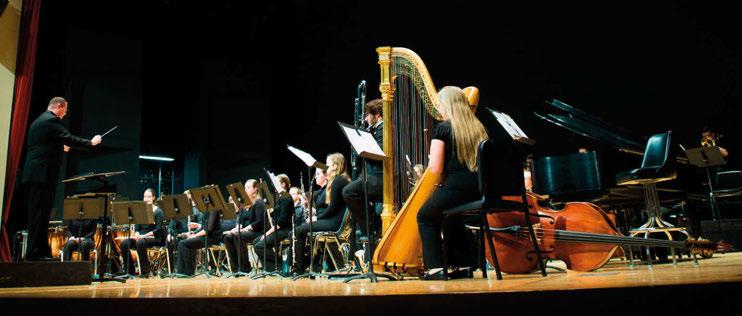
Chamber groups and small ensembles
Open to every student at OSU from all academic majors
Become part of this 124-year tradition ...
Ann Kosanovic-Brown, bassoon
Carol Robe, clarinet
Nathan Boal, saxophone
Lawrence Johnson, horn
Jay Chen, trumpet
Carson Keeble, trombone
JáTtik Clark, tuba/euphonium
Isaac Andrew, tuba
Richard Meyn, bass
Ryan Biesack, percussion



